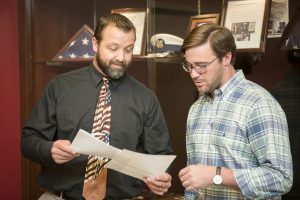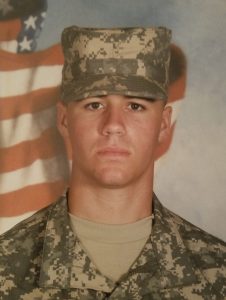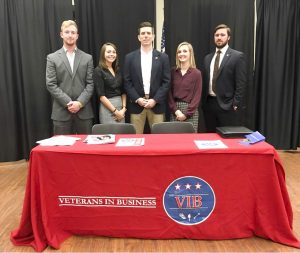
Tyler Hohbach didn’t know anyone in Tuscaloosa except for his younger sister.
He was 24, an Army veteran and a transfer student at The University of Alabama.
The first month of his first semester at UA was challenging. He saw students five or six years younger than him, connected and involved in multiple peer-building activities, but, as a transfer student, he wasn’t sure where he would fit in.
“Alabama does a really good job of uniting your class your first day on campus,” Hohbach said. “People build friends and networks on Day 1, and it’s hard to get into those social communities as a transfer.”
Through Get on Board Day, an annual student mixer sponsored by student support group, The Source, Hohbach connected with a group of students who shared more in common than he could imagine – the Campus Veterans Association.
The CVA provides a support network for UA students who are veterans or currently serving active duty, dependents, and survivors, providing scholarships, free social events and resources to enrich their experiences at UA.

Hohbach’s anxiety of being a non-traditional student was erased as he became more involved with CVA, eventually becoming president for a semester, a role that saw him lead a partnership with the UA chapter of the Public Relations Student Society of America.
Together, they formed the “In the Chair” campaign, an awareness effort to address student veterans’ needs on campus. The campaign was vital to the growth of the CVA and its impact at UA because there are many veterans on campus who don’t know the CVA exists or the benefits the Office for Veteran and Military Affairs provides, Hohbach said.
“One in 30 students in any given classroom is a veteran,” Hohbach said. “And, with so many veterans who aren’t connected on campus, sometimes it’s hard to find those guys.
“I’ve had instances where I see a military backpack, stop and ask a guy what his story is and ask ‘are you enrolled in VA healthcare?’ And they won’t know what that is, so I’ll give them a number and tell them call Will Suclupe (a UA liaison with the VA).”
Hohbach will earn his management information systems and finance degrees in December. And while he has a job lined up in New York, he remembers “sweating through his shirt six times” at his first career fair at UA. He was nervous and didn’t know how to approach potential employers, some of whom were his age.
“It’s a new environment, with hundreds of people around, and you have no idea how you’re supposed to act, what you’re supposed to say,” Hohbach said. “So, you flip back into the rigid military mindset – yes sir, no sir, yes ma’am. To some of these recruiters, it intimidates them. A lot of employers want to hire veterans for the leadership skills they have, but you have to develop those soft skills to approach people, be cordial and be casual at the same time.”

The experience and the job prep skills he learned through the MIS program inspired his most significant contribution to student veterans at UA: Veterans in Business, a student volunteer group that helps veterans prepare for job interviews.
Hohbach, along with former UA student veteran Alex Perez and fellow MIS classmate and military veteran Joey Bowden, created VIB in 2014.
“There’s a reason MIS has the highest placement rate and starting salary – from Day 1, you unintentionally find mentors, have mock interviews and learn from representative of Fortune 500 companies,” Hohbach said.
“The MIS program will have alumni come in and do this a week before the career fair at UA. We maybe had like six guys in MIS who were a part of it [ViB], but the goal was to get outside of the MIS program and help other veterans get ready for the workforce in the same way the MIS program helped us.”
Hohbach said there are two parts to a military veteran transitioning to a full-time student: first is simply adjusting and finding a support group on campus. Second is transitioning from student to professional, a process where VIB has its greatest impact.
It starts with the resume, where VIB mentors will help with verbiage and formatting to highlight translatable strengths and reduce clunky acronyms, often a staple of military communications.
The group also assists with other aspects of job interviews, like what to wear. VIB has worked with Tuscaloosa clothier Mobley & Sons to provide 12-month, interest-free financing on suits, shirts and ties to veterans.
“It’s also about being told ‘this is OK, you can do this,’” Hohbach said. “In the military, you’re not going to Google a future commander’s name and shoot him an email. In the civilian world, it’s OK to reach out to people working in the company or industry you are interested in. That shows desire and drive. We try to instill that.”
